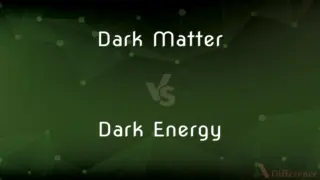Miscibility vs. Solubility — What's the Difference?
Edited by Tayyaba Rehman — By Maham Liaqat — Updated on April 8, 2024
Miscibility refers to the ability of two liquids to mix in any ratio without separating, while solubility is the ability of a substance to dissolve in a solvent, forming a homogeneous solution.

Difference Between Miscibility and Solubility
Table of Contents
ADVERTISEMENT
Key Differences
Miscibility is a specific term used to describe the compatibility of two liquids to fully blend into each other in all proportions. For instance, alcohol and water are miscible because they can combine in any ratio to form a clear, uniform liquid. On the other hand, solubility is a broader concept that applies to gases, liquids, and solids dissolving in a liquid solvent. It quantifies how much of a substance (solute) can dissolve in a solvent at a specific temperature to form a homogeneous solution. For example, salt is soluble in water up to a certain concentration beyond which additional salt will not dissolve.
The concept of miscibility is binary—it’s either yes or no. Two liquids are either miscible and can mix in any proportion, like vinegar and water, or they are immiscible, such as oil and water, which will separate into two distinct layers. Whereas solubility is not binary but rather quantified, as different substances have varying degrees of solubility in a solvent, often expressed in grams of solute per 100 grams of solvent.
Miscibility is primarily concerned with the interaction between two liquids, focusing on the molecular compatibility and the ability to form a single phase, regardless of the amount mixed. Solubility, however, deals with the interaction between a solute and a solvent, leading to the solute's dispersion within the solvent, which can be influenced by temperature, pressure, and the nature of both solute and solvent.
In discussions about miscibility, the emphasis is on the cohesive and adhesive forces between molecules of the liquids being mixed. For liquids to be miscible, their intermolecular forces (such as hydrogen bonding or van der Waals forces) must be compatible enough to allow for uniform mixing. In contrast, solubility discussions often involve the solvation process, where solvent molecules surround and interact with solute particles, leading to the dissolution of the solute.
Understanding the difference between miscibility and solubility is crucial in various scientific fields, including chemistry, pharmacology, and chemical engineering. Miscibility is a key factor in creating solutions, emulsions, and various chemical reactions involving liquids, while solubility plays a critical role in drug formulation, environmental science, and cooking, among others.
ADVERTISEMENT
Comparison Chart
Definition
Ability of two liquids to mix in any ratio.
Ability of a substance to dissolve in a solvent.
Applicable Phases
Liquids only.
Gases, liquids, and solids in liquids.
Binary or Quantitative
Binary (miscible or immiscible).
Quantitative (degrees of solubility).
Primary Concern
Molecular compatibility for forming a single phase.
The process of solute particles dispersing in a solvent.
Influence Factors
Intermolecular forces between liquids.
Temperature, pressure, nature of solute and solvent.
Examples
Alcohol and water are miscible.
Salt is soluble in water to a certain concentration.
Field of Relevance
Chemistry, chemical engineering.
Chemistry, pharmacology, environmental science.
Compare with Definitions
Miscibility
Essential in solution formation.
The miscibility of various alcohols in water is crucial for alcoholic beverage formulations.
Solubility
Involves solute dispersal in solvent.
Solubility is key in forming a homogeneous saltwater solution.
Miscibility
Relates to liquid-liquid mixtures.
Glycerin and water are completely miscible.
Solubility
Applicable to solids, liquids, and gases.
Carbon dioxide is soluble in water, forming carbonic acid.
Miscibility
The ability to mix without separating.
Ethanol is miscible with water in all proportions.
Solubility
Measure of how well a solute dissolves.
Sugar's solubility in water decreases with temperature.
Miscibility
Dependent on molecular forces.
Miscibility of alcohol and water is due to compatible hydrogen bonds.
Solubility
Quantitative, varies with conditions.
The solubility of salt in water varies with temperature.
Miscibility
Binary nature (miscible or immiscible).
Oil and water are immiscible.
Solubility
Critical in various applications.
Solubility is important in pharmaceuticals for drug delivery systems.
Miscibility
Miscibility () is the property of two substances to mix in all proportions (that is, to fully dissolve in each other at any concentration), forming a homogeneous mixture (a solution). The term is most often applied to liquids but also applies to solids and gases.
Solubility
Solubility is the property of a solid, liquid or gaseous chemical substance called solute to dissolve in a solid, liquid or gaseous solvent. The solubility of a substance fundamentally depends on the physical and chemical properties of the solute and solvent as well as on temperature, pressure and presence of other chemicals (including changes to the pH) of the solution.
Miscibility
Capable of being mixed in all proportions. Used of liquids.
Solubility
The quality or condition of being soluble.
Miscibility
The property of being able to be mixed.
Solubility
The amount of a substance that can be dissolved in a given amount of solvent.
Miscibility
The degree to which two things mix.
Oil and water have low miscibility.
Solubility
The condition of being soluble.
Miscibility
Capability of being mixed.
Solubility
(chemistry) The amount of a substance that will dissolve in a given amount of a solvent, to give a saturated solution, under specified conditions.
Solubility
The quality, condition, or degree of being soluble or solvable; as, the solubility of a salt; the solubility of a problem or intricate difficulty.
Solubility
The tendency to separate readily into parts by spurious articulations, as the pods of tick trefoil.
Solubility
The quality of being soluble
Solubility
The quantity of a particular substance that can dissolve in a particular solvent (yielding a saturated solution)
Common Curiosities
What is miscibility?
The capability of two liquids to blend together in any proportion, forming a single homogeneous phase.
What does solubility refer to?
The ability of a substance (solute) to dissolve in a solvent, creating a uniform solution.
Can the solubility of a substance change?
Yes, it can change with temperature, pressure, and the chemical nature of the solvent and solute.
Is water miscible with all liquids?
No, water is not miscible with all liquids; for example, it is immiscible with oil.
Can miscibility be partial?
No, miscibility is a binary concept; liquids are either completely miscible or immiscible.
What happens when a solute exceeds its solubility?
Excess solute will not dissolve and may precipitate or remain undissolved in the solution.
Are miscibility and solubility interchangeable terms?
No, miscibility specifically refers to the mixing of liquids, while solubility encompasses the dissolving process of gases, liquids, and solids in a solvent.
What determines if two liquids are miscible?
The compatibility of their intermolecular forces, such as hydrogen bonds or van der Waals forces.
What role does pressure play in solubility?
Pressure primarily affects the solubility of gases; for most solids and liquids, its effect is minimal.
How is solubility measured?
Typically in grams of solute per 100 grams of solvent at a specific temperature.
What is an example of a miscible mixture?
Alcohol and water are a common example of a miscible mixture.
Why is solubility important in medicine?
It determines how effectively a drug can be absorbed by the body when dissolved in a liquid.
Can immiscible liquids ever mix?
Immiscible liquids do not mix to form a homogeneous solution but can form emulsions with the help of emulsifying agents.
How does temperature affect solubility?
For most solids, solubility increases with temperature, while the solubility of gases in liquids decreases as temperature rises.
Does miscibility have any industrial applications?
Yes, in industries like pharmaceuticals, cosmetics, and food processing, understanding miscibility is crucial for product formulation.
Share Your Discovery

Previous Comparison
Imaginal vs. Imaginary
Next Comparison
Pub vs. RestaurantAuthor Spotlight
Written by
Maham LiaqatEdited by
Tayyaba RehmanTayyaba Rehman is a distinguished writer, currently serving as a primary contributor to askdifference.com. As a researcher in semantics and etymology, Tayyaba's passion for the complexity of languages and their distinctions has found a perfect home on the platform. Tayyaba delves into the intricacies of language, distinguishing between commonly confused words and phrases, thereby providing clarity for readers worldwide.















































